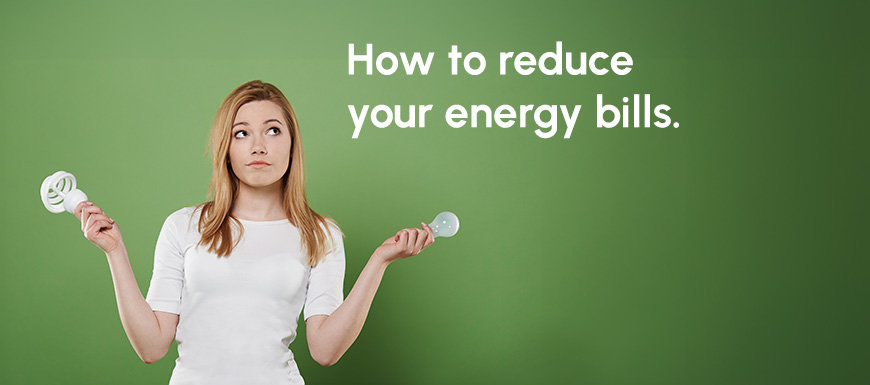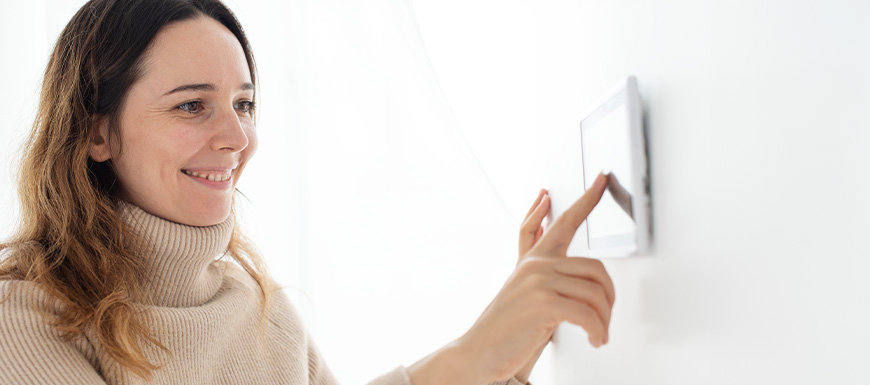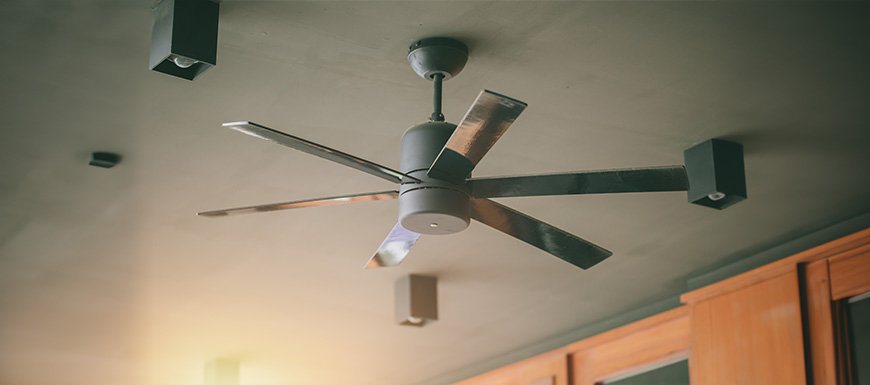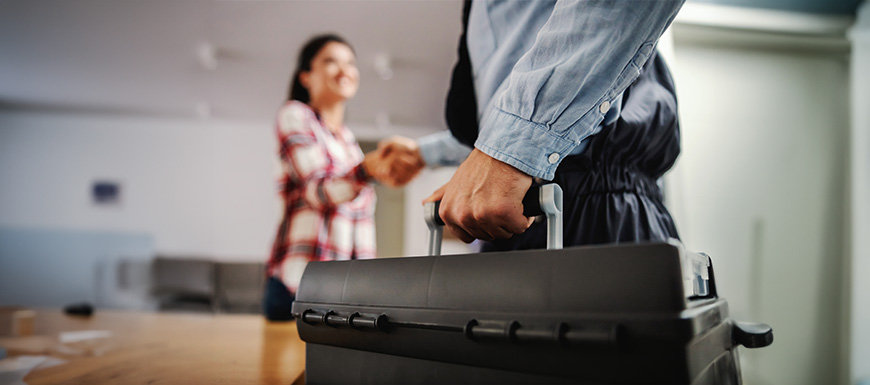
How many of us dread clicking on that email that says, “gas or energy bill”? Over the past couple of years, we have seen gas prices increase by 50% and confusing tier, time of use, and now low overnight electricity plans. It’s hard to know where to start. Well, if you are looking to improve your energy efficiency and save money on those utilities, we’ve got some energy-saving tips for you to try.
1.Start with the thermostat
Think of your thermostat as the command centre of your heating and cooling costs. It’s where you have the most control over what numbers follow the dollar signs on your bill at the end of the month. Thankfully programmable thermostats and smart thermostats are great energy saving investments that don’t cost a lot to buy. Some governments and utilities even offer rebates.
Programmable thermostats allow you to set up a schedule that works best for your family, lowering and raising the temperature. You can set it by day and even by hours, so when you are at work and school your home doesn’t have to pump the heat or AC for an empty house. Don’t forget to adjust your settings for vacations! If you’re away it means you don’t have to keep the HVAC pumping and use less energy.
Smart thermostats are more sophisticated programmable thermostats, giving you the freedom of mobile control, accessing it anywhere you are with your phone. Smart home technology will use AI to learn your family’s lifestyle habits adjusting the temperature to keep your home as comfortable and energy efficient as possible. Investing in smart technology can generate about 10 to 20 percent in energy savings per month.

2.Keep a tight temperature range
Not sure about the rest of world out there but the thermostat settings have caused a few arguments in our household. People have different comfort levels and apparently different approaches to the control centre. If you want to be energy efficient keeping your settings relatively constant is the best way to lower your energy bills.
On those really hot days avoid the urge to crank up your thermostat. It won’t make your house cool any faster and in fact will make your AC system work harder, using more energy. Air conditioners work by removing humidity from the house and that simply takes time.
Be sure to check your owner’s manual too. Many HVAC systems recommend temperature ranges that are the most energy efficient for the system. Remember, the smaller the difference in temperature between the inside of your home and the outside, the less energy you will use.
To figure out the right temperature for your family do a little testing. During the winter 20-21 degrees is ideal and in the summer 24-26 degrees should keep you comfortable and humidity levels in check.
3.Maintain your HVAC system
If you’ve read our blog before, you know we recommend regular preventative maintenance on your HVAC system. This is to protect the longevity of your furnace and AC, to improve the air quality of your home, and to reduce energy costs. A system that is running poorly is having to work harder and use more energy. Just like a car that never gets a tune-up, it will use more gas.
First order of business is to regularly change or clean your air filters in both your furnace and AC. The US Department of Energy, claims that changing your air filter can reduce your energy use by 5-15%. A new filter can boost efficiency, improve proper airflow and help prevent your systems from overheating.
In the summer you should change your HVAC system’s air filters once a month and every two to three months in the winter. If you have a lot of pets, or family members who suffer from severe allergies or asthma you may want to replace your air filters every 20-45 days for the best air quality.
Energy Star recommends an annual inspection and to follow a maintenance checklist to retain optimal energy efficiency. A HVAC professional can inspect your electrical connections, clean the filters and burners, check the pilot system in your furnace, look at the heating and cooling operations, and more.
4.Find and seal the leaks
Once you cool or heat the air in your home you want to keep it there. In the winter, 38% of your home's heat can be lost in leaks in your ductwork, and around doors and windows. This is like throwing money out the door! Sealing up drafts helps in conserving energy and save money on utilities. If you’re thinking about investing in new windows or HVAC systems getting an energy audit will qualify your home for government rebates and help you find air leaks in the process. If not, here are a few places you can check on your own:
Make sure your windows are closed and locked. Locking the window seals, it completely shut.
Look and feel for drafts coming from your window frames and doors. If you notice air or even light creeping through, you should add window insulation or caulking to seal these areas up.
Replace or apply weatherstrips to moveable components on windows and doors. This will help them shut more tightly.
Use expanding spray foam around plumbing, ductwork, wiring, and other breaches in your home's walls, ceilings and floors.
Check for any open drywall gaps or stud cavities in your walls and attic, and close them up.
Inspect your ductwork and if you find anything loose, use aluminum tape or mastic sealant.
Don’t forget to look over your home insulation as well. The EPA estimates you reduce your energy costs by up to 15% by adding insulation and sealing up drafts. Consider adding insulation to your attic, around the rim joints in your basement and in the floors above a crawl space. This is another good reason for an energy audit, they can help you determine your home insulation levels.
Finally, another major culprit in the draft department can be your wood-burning fireplace. If your fireplace is not in use, block the flue and seal your chimney, especially during the summer. Use the damper, invest in a chimney balloon or consider installing glass doors around the fireplace. In the winter shut the fireplace damper whenever it is not in use.

5.Crank your ceiling fans
If you’re working towards sustainable living and want to use your HVAC system less, ceiling fans are the way to go. Not only do they use less energy they can help regulate the temperature in your home all year long. In the summer run your fan counterclockwise to move the air and create a cooling effect on the skin. During the winter run your fans clockwise to bring the warm air from the top, down to the rest of the home. No matter the season, ceiling fans are a great energy-saving investment.
6.Cut down on your hot water
Water conservation is key part of sustainable living and a critical way to save energy. While we pay for all the water we use, hot water is by far the most expensive. Here are some eco-friendly tips to save water:
Take shorter showers. Monitor the time by installing energy saving gadgets like timers for your bathroom exhaust fans. As soon as the fan goes off so does the shower.
Install low-flow showerheads. They use less than 6-10 litres of water per minute
compared to a regular showerhead which can use 10 to 20 litres of water.
Wash your clothes in cold water.
Look at new energy saving appliances. Your washing machine uses more water than your shower and dishwasher combined! If your washing machine is getting old, look at buying an Energy Star appliance and up your water conservation game!

7.Upgrade your HVAC system
As HVAC systems age they run at a lower efficiency, meaning it’s using more energy to do the same job it did when it was new. A technician can measure how well your HVAC system is running and if it’s over 15 years old, or a mid-efficiency unit, you might want to consider an upgrade. By choosing an ENERGY STAR-rated HVAC unit, you will improve your energy efficiency by up to 20%, saving on both your heating and cooling costs.
The HVAC market also has new options in the product line-up. Geothermal or Air Source Heat pumps are moving the residential heating and cooling system away from natural gas and over to electricity as a power source. These systems will reduce your carbon footprint and replace both your furnace and air conditioner!
Energy-saving tips
To cap it all off try these tested and true ways to conserve energy:
Pay attention to the time of day, most electricity companies charge different rates depending on peak power loads. Run those big appliances during low-peak periods.
Adjust the water heater to 120 degrees and look at installing an insulating blanket.
Always run the washing machine, dishwasher and dryer with a full load.
Use the auto or eco setting on your dishwasher and avoid using the heated-dry setting.
Take advantage of the sun and buy a clothesline to dry your clothes outside.
On hot summer days pick the BBQ or the microwave to make your dinner and avoid adding turning on the oven.
Save energy. Save money. Save the environment!
